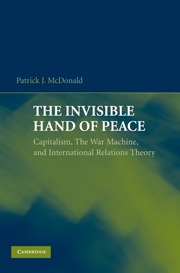Book contents
- Frontmatter
- Contents
- List of Tables
- Acknowledgments
- 1 American Grand Strategy and the Liberal Peace
- 2 Liberal International Relations Theory on War
- 3 Releasing the Invisible Hand
- 4 Liberal Economic Institutions and Peace in the Twentieth Century
- 5 Free Trade and Peace in the First Era of Globalization
- 6 From Rivalry to Friendship
- 7 The Achilles' Heel of Liberal International Relations Theory?
- 8 Peace Across the Taiwan Strait?
- 9 The Invisible Hand or the Ballot Box?
- 10 Capitalism and America's Peaceful Market Power
- References
- Index
- References
References
Published online by Cambridge University Press: 05 June 2012
- Frontmatter
- Contents
- List of Tables
- Acknowledgments
- 1 American Grand Strategy and the Liberal Peace
- 2 Liberal International Relations Theory on War
- 3 Releasing the Invisible Hand
- 4 Liberal Economic Institutions and Peace in the Twentieth Century
- 5 Free Trade and Peace in the First Era of Globalization
- 6 From Rivalry to Friendship
- 7 The Achilles' Heel of Liberal International Relations Theory?
- 8 Peace Across the Taiwan Strait?
- 9 The Invisible Hand or the Ballot Box?
- 10 Capitalism and America's Peaceful Market Power
- References
- Index
- References
- Type
- Chapter
- Information
- The Invisible Hand of PeaceCapitalism, the War Machine, and International Relations Theory, pp. 309 - 330Publisher: Cambridge University PressPrint publication year: 2009



